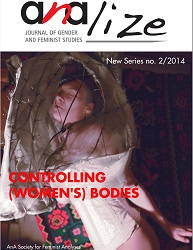State Policies and the Women’s Body: The Turkish Case
State Policies and the Women’s Body: The Turkish Case
Author(s): Ulaş SunataSubject(s): Gender Studies, Gender history, Islam studies, Government/Political systems, Nationalism Studies
Published by: Societatea de Analize Feministe AnA
Keywords: state feminism; embodiment; Turkey;
Summary/Abstract: This article examines the question of how women are embodied in state feminisms. The focus is on women whose placement in political discourses and policies is problematic in some cases for some reasons, such as who make governmental actions to strengthen women’s position in society; to what end; women’s role and participation in the policy making process; legislative, executive and juridical representation of women; and their relation with feminist movement. How women are located in the society defines not only that women’s position but also the position of men in relation to women. That is the reason why this paper considers state policies on women not always to improve women status but to locate women in, or attach them to the related political visions. The notion of bio-politics is central to Foucault’s work in the context of body and population. He uses the term bio-politics, derived from his own notion of bio-power, as the implementation of state power over both the physical and political bodies of a population. Thus, state policies on physical bodies of women are highly significant for an analytical understanding of both social structures and transformations. I shall present the Turkish case to illustrate a kind of state feminism. The emergence of Turkish state feminism at the turn of the 20th century is a master key to analyze state policies on the women’s body regarding to the Turkish transformation. However, we recognize a line of rupture from the primary policies at the turn of the new century. Besides supranational policies, the recent state feminism has a new paradigm for women of Turkey. This paper attempts to question not only the paradigm shift from the Westernist to the post-Islamist reason but also the negative impact of their existence on women as individuals and feminist solidarity.
Journal: AnALize: Revista de studii feministe
- Issue Year: 2014
- Issue No: 2 (16)
- Page Range: 73-95
- Page Count: 20
- Language: English

